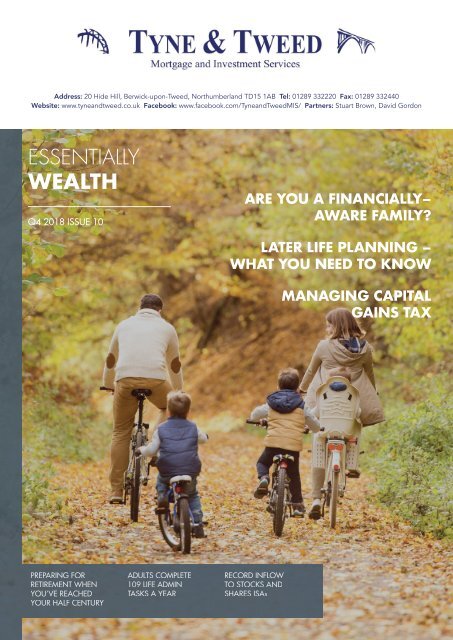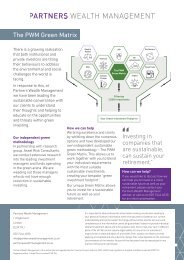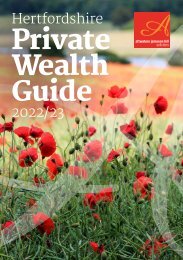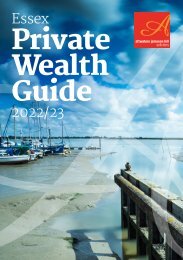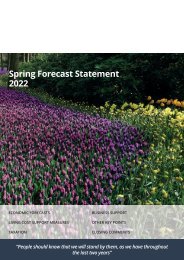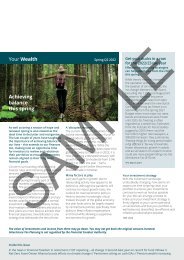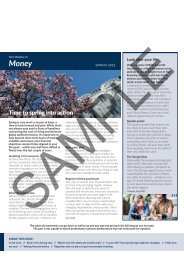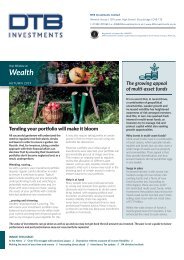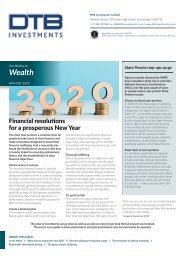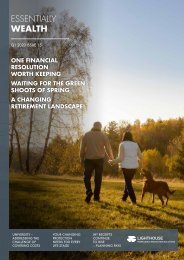You also want an ePaper? Increase the reach of your titles
YUMPU automatically turns print PDFs into web optimized ePapers that Google loves.
Address: 20 Hide Hill, Berwick-upon-<strong>Tweed</strong>, Northumberland TD15 1AB Tel: 01289 332220 Fax: 01289 332440<br />
Website: www.tyneandtweed.co.uk Facebook: www.facebook.com/<strong>Tyne</strong>and<strong>Tweed</strong>MIS/ Partners: Stuart Brown, David Gordon<br />
ESSENTIALLY<br />
WEALTH<br />
Q4 <strong>2018</strong> ISSUE 10<br />
ARE YOU A FINANCIALLY–<br />
AWARE FAMILY?<br />
LATER LIFE PLANNING –<br />
WHAT YOU NEED TO KNOW<br />
MANAGING CAPITAL<br />
GAINS TAX<br />
PREPARING FOR<br />
RETIREMENT WHEN<br />
YOU’VE REACHED<br />
YOUR HALF CENTURY<br />
ADULTS COMPLETE<br />
109 LIFE ADMIN<br />
TASKS A YEAR<br />
RECORD INFLOW<br />
TO STOCKS AND<br />
SHARES ISAs
2 Q4 <strong>2018</strong> ISSUE 10<br />
IN THIS ISSUE<br />
ARE YOU A FINANCIALLY-AWARE FAMILY? 2<br />
PREPARING FOR RETIREMENT WHEN YOU’VE REACHED YOUR HALF CENTURY 3<br />
ADULTS COMPLETE 109 LIFE ADMIN TASKS A YEAR 3<br />
PROTECTION PLANS FOR ENTREPRENEURS 4<br />
RECORD INFLOW TO STOCKS AND SHARES ISAs 5<br />
MANAGING CAPITAL GAINS TAX 5<br />
ARE WOMEN BETTER SAVERS THAN MEN? 6<br />
WHAT YOU SHOULD DO BEFORE YOU ENTER DRAWDOWN 6<br />
LATER LIFE PLANNING – WHAT YOU NEED TO KNOW 7<br />
THE AVERAGE PERSON NEEDS £260,000 FOR RETIREMENT 8<br />
HALF OF PENSIONERS PLAN TO WORK ON INTO RETIREMENT 8<br />
ARE YOU A FINANCIALLY-AWARE FAMILY?<br />
In many families, having a frank<br />
discussion about money remains<br />
a taboo. Many married couples<br />
reportedly don’t know how much<br />
money their spouse earns. Welloff<br />
parents can sometimes shy<br />
away from letting their children<br />
know too much about their<br />
wealth, in an effort to prevent<br />
them becoming complacent<br />
about what they might inherit<br />
in the years to come and losing<br />
their work ethic.<br />
Teaching the basics<br />
With financial issues rarely<br />
discussed, children can<br />
sometimes find it hard to<br />
manage their money when they<br />
get older.<br />
Involving children in decisions<br />
that impact the family finances<br />
will help them understand that<br />
sometimes, choices have to be<br />
made in order to keep within a<br />
budget. Knowing how interest<br />
rates affect the amount you<br />
have to repay on a loan or<br />
credit card is a valuable lesson<br />
that will stand them in good<br />
stead in later life.<br />
Explaining the positive effects<br />
of compound interest on money<br />
that’s saved over the years<br />
can spark a child’s interest<br />
in opening their own savings<br />
account, especially when they<br />
hear that Einstein referred to<br />
compound interest as “the<br />
eighth wonder of the world”.<br />
Although retirement is a lifetime<br />
away, it’s worth talking about<br />
pensions too; ideally, everyone<br />
should start contributing to their<br />
pension the day they begin<br />
work, so understanding the need<br />
to save for retirement as early as<br />
possible makes good sense.<br />
A Junior ISA is a great way<br />
to teach children about taxefficient<br />
savings, giving them<br />
an opportunity to watch their<br />
money grow over the years.<br />
Looking to the future<br />
Experiencing difficulties in<br />
talking openly about money<br />
isn’t a problem confined just to<br />
teenagers. The Bank of Mum<br />
and Dad is often called upon<br />
to help their offspring get on to<br />
the housing ladder. Discussing<br />
as a family the impact this could<br />
have on their living standards<br />
in retirement is an important<br />
conversation for parents to have.<br />
With the older generation living<br />
longer and potentially needing<br />
help with their finances in their<br />
later years, it’s important for<br />
children of any age to be able<br />
to communicate effectively<br />
about financial issues with their<br />
parents. With more families<br />
finding themselves drawn into<br />
the Inheritance Tax net, effective<br />
planning strategies can reduce<br />
the amount of tax payable.<br />
Taking the time to discuss<br />
important matters like Wills and<br />
Lasting Powers of Attorney with<br />
other family members will help<br />
to ensure that the right plans<br />
are in place to safeguard family<br />
interests and help prevent<br />
misunderstandings, squabbles<br />
and administrative problems<br />
arising later on.<br />
INVOLVING CHILDREN<br />
IN DECISIONS THAT<br />
IMPACT THE FAMILY<br />
FINANCES WILL HELP<br />
THEM UNDERSTAND<br />
THAT SOMETIMES<br />
CHOICES HAVE TO<br />
BE MADE IN ORDER<br />
TO KEEP WITHIN A<br />
BUDGET<br />
The value of investments<br />
and the income they<br />
produce can fall as well<br />
as rise. You may get back<br />
less than you invested.<br />
The value of pensions and<br />
the income they produce<br />
can fall as well as rise.<br />
You may get back less<br />
than you invested.
ESSENTIALLY WEALTH<br />
3<br />
PREPARING FOR RETIREMENT<br />
WHEN YOU’VE REACHED<br />
YOUR HALF CENTURY<br />
When people reach their<br />
50s, they often begin to realise<br />
that retirement, in whatever<br />
form they decide to take it,<br />
suddenly feels an awful lot<br />
nearer. If you’re in that age<br />
group and haven’t yet given<br />
the prospect much thought,<br />
now is a good time to start<br />
thinking about the years<br />
that lie ahead.<br />
Plan ahead<br />
When do you envisage starting your<br />
retirement? Having an approximate date<br />
in mind will help you work out a budget<br />
for your later years. Typically, retirees need<br />
more money to spend in their active years<br />
on things like travel and hobbies. Later in<br />
retirement they tend to need less income,<br />
with their spending levels likely to increase<br />
towards the end of their life if they need<br />
residential or nursing care.<br />
Get a pension check<br />
Now is the time to review your pension<br />
arrangements to see if they are on track<br />
to provide the level of retirement income<br />
you’ll need. At this point, if it looks as<br />
if you need to save more to reach your<br />
target income, you still have a few years<br />
in which to step up your contributions<br />
if your earnings will allow.<br />
You should also keep track of any pensions<br />
you may have accumulated with past<br />
employers and take advice about whether<br />
it would be in your best interests to<br />
consolidate them into just one plan.<br />
It also makes sense to get a state pension<br />
forecast, and to check when you will<br />
receive it, as the state pension age is<br />
increasing to 67 between 2026 and 2028.<br />
There’s a lot to consider in the run-up to<br />
retirement; we’re here to help.<br />
If you’re making plans for your<br />
retirement and would like some<br />
professional advice, then please<br />
get in touch.<br />
The value of pensions and the<br />
income they produce can fall as<br />
well as rise. You may get back<br />
less than you invested.<br />
ADULTS COMPLETE<br />
109 LIFE ADMIN<br />
TASKS A YEAR<br />
Most of us have a list<br />
of personal admin tasks<br />
that need doing, such as<br />
paying bills, managing<br />
our mortgage, topping up<br />
our savings or checking<br />
our bank statements.<br />
On occasions we can all<br />
struggle to get through<br />
what seems to be a<br />
never-ending ʻto do’ list.<br />
A recent survey 1 shows that the<br />
average adult has four important<br />
tasks currently pending, but never<br />
enough time to do them. These<br />
admin tasks include important<br />
things like managing their<br />
mortgage and reviewing their<br />
insurance and savings.<br />
Whilst admin tasks can be a pain,<br />
tackling them can be financially<br />
rewarding, and give you a sense of<br />
achievement and peace of mind that<br />
you’ve finally accomplished them.<br />
Getting the help you need<br />
Working with an adviser can<br />
help you tackle some of those tasks<br />
you know you should attend to.<br />
We can review your mortgage,<br />
tell you if you’re saving enough<br />
in your pension, help you put the<br />
right protection policies in place to<br />
protect you and your family, and<br />
much more besides.<br />
1<br />
AAT (Association of Accounting<br />
Technicians), <strong>2018</strong>
4 Q4 <strong>2018</strong> ISSUE 10<br />
PROTECTION PLANS FOR ENTREPRENEURS<br />
Whilst businesses are generally<br />
quick to insure themselves<br />
against the most commonlyencountered<br />
operational risks,<br />
it’s often the case that owners,<br />
directors and shareholders can<br />
overlook the need to protect<br />
what’s arguably their biggest<br />
and most precious asset –<br />
themselves, their management<br />
team and their workforce.<br />
In today’s fast-paced business environment,<br />
it can be hard to find management time to<br />
think about those ‘what if’ scenarios that<br />
can happen to any business at any stage<br />
of its development. However, research<br />
has shown that more than half of all UK<br />
small and medium-sized enterprises would<br />
close within a year if a key employee<br />
were to die or become critically ill 1 .<br />
Planning for the unexpected<br />
An analysis of your business protection requirements is an important<br />
first step in highlighting the risks you run and will enable your adviser to recommend<br />
the right solutions. These will vary from business to business, but could include:<br />
Key person insurance<br />
– insurance that pays a lump sum if someone integral to the business dies<br />
or is diagnosed with a serious illness.<br />
Relevant life plans<br />
– a term assurance plan that provides death-in-service benefits for employees with the<br />
premiums paid for by the employer. Employers can choose the level of cover and the<br />
length of the policy term they require to suit their specific business needs.<br />
Shareholder protection policies<br />
– these provide vital finance in the event of the death of a shareholder or partner in the<br />
business, removing the need for the remaining shareholders to rush to find the funds to<br />
buy out the deceased’s shares.<br />
If you could use some advice on securing the future of your business, do get in touch.<br />
1<br />
Legal & General, 2017
ESSENTIALLY WEALTH<br />
5<br />
RECORD INFLOW<br />
TO STOCKS AND<br />
SHARES ISAs<br />
During the 2017-18 tax year to April<br />
<strong>2018</strong>, the popularity of stocks and<br />
shares ISAs continued to grow, with<br />
246,000 new accounts sunscribed<br />
to. The amount paid into this type of<br />
ISA account hit a record £28.7bn<br />
over the period, up from £22.3bn<br />
the previous tax year.<br />
Stocks and shares ISAs have been<br />
popular investments for millions<br />
of people since they were first<br />
introduced back in 1999, not<br />
least because they combine the<br />
opportunity to save for the long-term<br />
with generous tax benefits.<br />
Higher limits<br />
The amount you can save during this<br />
tax year is £20,000. It’s important to<br />
remember that any unused allowance<br />
can’t be carried forward, so in order<br />
not to miss out on the tax benefits, you<br />
need to ensure you have your money<br />
invested before the tax year-end.<br />
Tax advantages<br />
Any increase in the value of the<br />
investments held in a stocks and<br />
shares ISA is free from Capital Gains<br />
Tax. Income from interest-paying<br />
investments, such as government and<br />
corporate bonds, is free of income<br />
tax, so too are dividends paid on<br />
equity investments.<br />
Cash or stocks and shares<br />
You can put part of your annual ISA<br />
allowance into a cash ISA. Choosing<br />
between funding a cash ISA and a<br />
stocks and shares ISA will depend<br />
on your investment goals and your<br />
personal risk profile. Unlike cash,<br />
stocks and shares are subject to<br />
market volatility.<br />
Generally speaking, if you’re<br />
planning to withdraw your funds<br />
within the next five years, say for a<br />
deposit on a home or other major<br />
expense, then a cash ISA would be<br />
the low risk option.<br />
MANAGING CAPITAL GAINS TAX<br />
Capital Gains Tax (CGT) is<br />
charged on the profit or gain<br />
made when you sell an asset.<br />
You won’t pay CGT on the<br />
sale of your principal private<br />
residence, stocks and shares<br />
held within an ISA, proceeds<br />
from life insurance policies,<br />
or the sale of a private car.<br />
However, assets such as shares,<br />
collective investments and<br />
second properties that generate<br />
a capital gain are generally<br />
liable to CGT.<br />
Different rates apply<br />
Every individual gets an exemption to set<br />
against any capital gains they have made<br />
in that tax year. For tax year <strong>2018</strong>-19,<br />
this is £11,700.<br />
After offsetting your annual exemption,<br />
CGT is charged at different rates,<br />
depending on your income tax band. So,<br />
for tax year <strong>2018</strong>-19, basic rate taxpayers<br />
will pay 10% and higher rate or additional<br />
rate taxpayers will pay 20%.<br />
There is a higher charge for those selling<br />
a second home, 18% for those in the basic<br />
rate income tax band, and 28% in the<br />
higher or additional rate income tax band.<br />
However, there are various reliefs available<br />
that can, in appropriate circumstances, be<br />
applied to reduce the tax payable, such<br />
as deemed occupation, principal private<br />
residence and lettings relief.<br />
Reducing the amount payable<br />
Since the rate of CGT you pay depends<br />
on your income tax band, making pension<br />
contributions or charitable donations could<br />
reduce your CGT liability. Making maximum<br />
use of your ISA allowance makes sense too,<br />
as any gains you make are tax-free.<br />
Transfers made between spouses or civil<br />
partners are not liable to CGT, so for<br />
planning purposes it can pay to look<br />
at CGT as a couple.<br />
Getting professional advice<br />
Taxation can be complex, so professional<br />
advice is essential.<br />
TRANSFERS MADE BETWEEN<br />
SPOUSES OR CIVIL PARTNERS<br />
ARE NOT LIABLE TO CGT, SO<br />
FOR PLANNING PURPOSES IT<br />
CAN PAY TO LOOK AT CGT AS<br />
A COUPLE<br />
The value of investments<br />
and the income they produce<br />
can fall as well as rise. You<br />
may get back less than<br />
you invested. The value of<br />
pensions and the income they<br />
produce can fall as well as<br />
rise. You may get back less<br />
than you invested.
6 Q4 <strong>2018</strong> ISSUE 10<br />
ARE WOMEN BETTER SAVERS THAN MEN?<br />
This is the age-old question<br />
that is often hotly debated.<br />
New research shows that<br />
when it comes to pension<br />
saving, women are heeding<br />
the message that for a<br />
comfortable retirement you<br />
need to keep an eye on your<br />
pension throughout your<br />
working life, and they’re<br />
saving more for their future<br />
than men, after adjusting for<br />
the difference in earnings.<br />
However, the fact that women are<br />
saving more as a percentage of their<br />
earnings, but still achieving lower<br />
balances in their pension plans, shows<br />
the effect that the gender pay gap<br />
continues to have.<br />
WOMEN’S EXPECTED<br />
RETIREMENT INCOME WILL HIT<br />
A RECORD HIGH THIS YEAR<br />
Working patterns<br />
It can be hard for women to keep up<br />
the pension savings momentum. Having<br />
time out to raise a family, or taking care<br />
of elderly parents, often means that their<br />
working patterns may change over the<br />
course of their working life.<br />
The research 1 showed that women’s<br />
expected retirement income will hit a record<br />
high this year, but their average retirement<br />
income is still likely to be around £5,000<br />
lower than men’s.<br />
1<br />
Prudential, <strong>2018</strong><br />
WHAT YOU SHOULD DO BEFORE<br />
YOU ENTER DRAWDOWN<br />
Since the pension reforms in 2015, more than half a million<br />
people have put their pension into income drawdown.<br />
If you’re new to stock market investment, then it makes<br />
sense to get advice on how best to do this, how much<br />
money to invest and what funds would best suit your needs.<br />
Taking the right decisions about your pension pot at this<br />
stage is vitally important, as you will want your money to<br />
last as long as you do.<br />
Get the financial facts<br />
It pays to start by drawing up a budget covering what you<br />
think you’ll need to spend to cover your living expenses in<br />
retirement. This will enable you to see how much income<br />
you can afford to take from your pension.<br />
It’s also important to remember that when you take money<br />
out of your pension, only 25% is tax-free. If you take out<br />
more than that, it’s taxable and you might find yourself<br />
paying tax at a higher rate. Good advice will help you<br />
take the right decisions at the right time.<br />
SINCE THE PENSION REFORMS IN 2015,<br />
MORE THAN HALF A MILLION PEOPLE HAVE PUT<br />
THEIR PENSION INTO INCOME DRAWDOWN
ESSENTIALLY WEALTH<br />
7<br />
LATER LIFE PLANNING<br />
– WHAT YOU NEED<br />
TO KNOW<br />
Planning is a major part of everyday<br />
life; we’re always thinking how to<br />
make the best use of our time and money,<br />
and as we get older we recognise<br />
the need for careful financial<br />
and legal planning too.<br />
If you’re making plans for your retirement and would<br />
like some professional advice, then please get in touch.<br />
There are some key issues older people<br />
need to consider. These can include writing<br />
or updating their Will to ensure that their<br />
estate will be distributed according to their<br />
wishes, putting in place Lasting Powers of<br />
Attorney to safeguard their finances and<br />
their healthcare, making plans for later life<br />
care and transferring assets tax-efficiently to<br />
the next generation.<br />
Making a Will<br />
Having an up-to-date Will in place that<br />
reflects how you want your estate to be<br />
distributed on your death is the cornerstone<br />
of good estate planning. Sadly, statistics<br />
show that around two thirds of UK residents<br />
have yet to take this simple step 1 , including<br />
42% of over 55s. The figures reveal that<br />
one and a half million people haven’t<br />
updated their Will since getting married,<br />
making it void. Wills can have a major part<br />
to play in managing your estate’s liability to<br />
inheritance tax too.<br />
Safeguarding your wishes<br />
A Will isn’t the only piece of forward<br />
planning you should consider. A Lasting<br />
Power of Attorney enables you to choose<br />
the person or people who would be in<br />
charge of making decisions which affect<br />
you, if you are not able to do this for<br />
yourself. This makes things easier for family<br />
and relatives if you lose capacity, helping<br />
ensure that decisions that affect you would<br />
be made in your best interests, and that<br />
your affairs, both your financial and your<br />
health, are managed in the way you would<br />
have wanted.<br />
Inheritance Tax planning<br />
In the 2017-18 tax year, according to<br />
statistics from HM Revenue & Customs,<br />
Inheritance Tax receipts hit a hefty £5.2bn,<br />
brought about largely by rising property<br />
prices that are seeing more and more<br />
families drawn inexorably into the tax net.<br />
However, with careful planning and the<br />
use of annual tax exemptions, it is possible<br />
to reduce the amount of tax that would<br />
otherwise be payable.<br />
Care in later life<br />
Many people simply use the savings they<br />
have built up over the years to pay for<br />
the care they need. However, there are<br />
other ways to cover fees such as specialist<br />
long-term plans that are purchased with a<br />
lump sum and in return pay a guaranteed<br />
income for as long as you live. Taking<br />
financial advice will help ensure you’ve<br />
planned effectively for your future.<br />
1<br />
Macmillan Cancer Support, <strong>2018</strong>
8 Q4 <strong>2018</strong> ISSUE 10 ESSENTIALLY WEALTH<br />
THE AVERAGE<br />
PERSON NEEDS<br />
£260,000 FOR<br />
RETIREMENT<br />
Research carried out by the Pension<br />
& Lifetime Savings Association shows<br />
that the majority of people would find<br />
it much easier to plan for retirement if<br />
they had income targets to guide them.<br />
The trade body is proposing three target<br />
levels covering ‘minimum’, ‘modest’ and<br />
‘comfortable’ incomes and recommends<br />
carefully-chosen titles to ensure they are<br />
correctly interpreted. This approach is<br />
already used in Australia where it is<br />
said to make it much easier for savers<br />
to work out if they are saving enough.<br />
Current estimates<br />
According to a recent report entitled<br />
“Will we ever summit the pensions<br />
mountain?” 1 the amount that the average<br />
person will need to fund a comfortable<br />
retirement, based on someone opting<br />
to stop work at 65 and buying a singlelife<br />
annuity with inflation protection, has<br />
reached £260,000.<br />
The report also points out that those<br />
who don’t make it onto the housing<br />
ladder will need to pay rent during their<br />
retirement years, so for them the figure<br />
will be even higher at £445,000. In<br />
arriving at these figures, the research<br />
assumed average earnings of £27,000<br />
a year, and a full state pension of just<br />
over £8,500.<br />
Make an early start<br />
The sooner you start, the longer your<br />
contribution has to grow.<br />
One of the most attractive features of<br />
pension saving is the tax relief. If you<br />
make contributions to a pension, or if your<br />
employer deducts your payments from your<br />
salary, you automatically get 20% tax relief<br />
as an additional deposit into your pension<br />
pot. If you are a higher-rate taxpayer<br />
you can claim an extra 20%, while those<br />
paying additional-rate tax can claim back<br />
an extra 25%. When you retire, you can<br />
take 25% of your savings as a tax-free lump<br />
sum, though not necessarily all in one go.<br />
If you save into a workplace pension, your<br />
employer should match some or all of your<br />
contributions, providing a welcome boost to<br />
your pension.<br />
Getting the right advice<br />
Everyone would like to look forward to a<br />
financially-comfortable retirement that can<br />
be enjoyed rather than endured. Taking<br />
financial advice will ensure that you put the<br />
right pension plans in place from the outset<br />
and know what your savings target should<br />
be. You’ll also be offered regular reviews to<br />
help ensure you keep your pension savings<br />
on track.<br />
1<br />
Royal London, <strong>2018</strong><br />
HALF OF<br />
PENSIONERS<br />
PLAN TO WORK<br />
ON INTO<br />
RETIREMENT<br />
What will your<br />
retirement be like?<br />
Today, retirement<br />
means different things<br />
to different people.<br />
Many choose to work on in<br />
their existing job, but may<br />
reduce their hours. Others take<br />
a new direction in their lives,<br />
perhaps a change of career,<br />
the chance to pursue a hobby,<br />
or the opportunity to volunteer<br />
for a good cause. Others<br />
relish the opportunity of a<br />
well-earned rest.<br />
According to a recent survey,<br />
54% of respondents who<br />
were considering working into<br />
retirement, or who were already<br />
doing so, said they viewed it<br />
as a way of keeping active and<br />
mentally stimulated.<br />
However, around 8% of those<br />
scheduled to retire in <strong>2018</strong> have<br />
had to put their plans on hold<br />
as they cannot afford to retire.<br />
Of these, nearly half blamed<br />
the rising cost of living for their<br />
decision.<br />
Planning ahead<br />
These findings highlight the<br />
importance of saving as much as<br />
possible as early as possible into<br />
your pension, so you can choose<br />
to work if you want to, but can<br />
retire if you prefer.<br />
1<br />
Prudential, <strong>2018</strong><br />
If you’re making plans for your retirement and would like some professional advice, then please get in touch.<br />
The value of pensions and the income they produce can fall as well as rise. You may get back less than you invested.<br />
It is important to take professional advice before making any decision relating to your personal finances. Information<br />
within this document is based on our current understanding and can be subject to change without notice and<br />
the accuracy and completeness of the information cannot be guaranteed. It does not provide individual tailored<br />
investment advice and is for guidance only. Some rules may vary in different parts of the UK.


